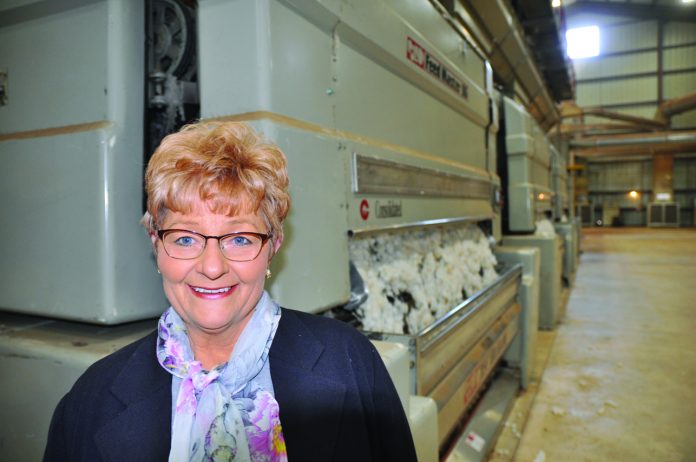
by Bryan Painter
CARNEGIE – If it’s possible for a person and a place to share a path through their lives, that person is Jeannie Hileman and that place is the Carnegie Gin.
The Carnegie Gin, managed by Hileman, has produced and persisted through literally the best of times and the worst. The Carnegie Gin was established in 1925. This most recent crop, 2017, ranked as the 11th best in state history in terms of production. That means the Carnegie Gin, although it has taken on different looks through the years, has been around for eight of the top 11 best cotton crops in Oklahoma dating to records of 1894, and also eight of the 11 worst cotton crops in that time span. Right now, Hileman is experiencing some of the best times in recent cotton history.
Not only was last year the 11th best in state history, this next crop of Oklahoma Upland Cotton will be planted on 16 percent more acres than in 2017, according to a United States Department of Agriculture National Agricultural Statistics Service prospective planting forecast.
However Hileman, who started working at the gin in 1990, has seen several of the worst years: seven of the worst 11 to be specific. Consistently optimistic, she notes that during the drought that began in Oklahoma in about October 2010, “We really did not have the problems most did. We had underground irrigation wells to pull us through those bad years. We were the largest gin in the state for three years.”
Regardless of the circumstances, good or bad, Hileman greets each day with the same pleasant, unforced grin.
“During the really lean years, I was the only employee,” Hileman said. “I would have to recruit a new gin crew every year. During the years 1997-2000 we never ginned 1,000 bales in a year. In 1998 we only ginned 204 bales. It was really hard keeping the doors open, trying to make payroll until we would get our first seed check. There was a time when I had six payroll checks that couldn’t be cashed until the revenue started coming in. I enjoyed my work and my farmers and wanted to see it through.”
Strong friendships
Jeannie met Randall Hileman during her junior year in high school, at a local drive-in called Ski Boy, where she worked in Fort Cobb. They were a match from the start she said and were married on Dec. 11, 1971. At the time, he was farming as part of his family’s operation. They continued to expand the farm. The Hilemans raised cattle and at one time had hogs. They also grew wheat, peanuts, cotton and milo. More importantly they also raised a son Aaron and a daughter Sadie.
Fast-forward to 2008.
“We were decorating for Sadie’s junior prom when Randall decided there was something seriously wrong with him,” Jeannie Hileman said. “In June of 2008 we were told he wouldn’t see Sadie graduate unless he got a lung transplant. Talk about heartbreaking, stressful, emotional rollercoaster. Barnes-Jewish Hospital was where he needed to be.”
St. Louis was quite a distance from western Caddo County in Oklahoma. Plus, Randall would have to live within two hours of the hospital. There was a list of qualifications he had to meet before being placed on the transplant list. He checked everything off on his list. His health got better, but his lungs had gotten worse. They were ready to place him on the transplant list.
He would need a caretaker to move to St. Louis with him. Jeannie couldn’t leave her job because Randall’s insurance was through the gin. Aaron had a 4-year old and one on the way. Sadie had graduated, so Sadie and Randall moved to Missouri in July.
While the gin and Hileman have traveled a winding business path together, they’ve also meant more to each other than that.
When Randall became ill, the community had a fundraiser to help with living expenses. Monsanto donated chemical that Jeannie’s producers purchased at an inflated price. Helena Chemical Co. purchased plane tickets for her to visit her husband and daughter.
“Many of my cotton producers helped us so much, financially and emotionally,” Hileman said. “I have helped with many charitable benefits, but this was the hardest. It is much easier to help someone, than to have to accept the help. Most people will be on the transplant list for over a year before a match becomes available. We really did not know what God had planned for us, but we just had to put it in his hands. I had moved them in and helped them get settled, came home to start the wait. I was home less than a week when he got the call, ‘We have lungs for you.’” Aaron, his son Hayden, and Jeannie headed that way, and Randall was already in surgery when they arrived.
“Everything went great, and the rest is history, eight years and two grandsons later,” she said.
Christmas money
In 1990 Hileman was handling the bookkeeping for her husband and his brother when the board of the Carnegie Gin asked if she wanted to hire on to do some seasonal work with farm records. It was an opportunity for “Christmas money.”
She liked it and decided to stay. Others moved on, and Hileman became office manager and by 1995-96 was the gin manager. Consider that 1995 is tied for the third worst cotton year in Oklahoma in production. Things didn’t get a lot prettier: 1996 is the sixth worst, 1998 is the seventh and 1999 ranks eighth.
She was trying to hold on until genetics and more advanced protection against pest and weed threats arrived. “We were going to get rid of boll weevils, bollworms and weeds, but we just didn’t believe we were going to be able to hold onto our cotton gin long enough for all of those things to happen,” Hileman said in an interview with Southwest Farm Press.
They did hold on. How?
“Pride, determination and of course stubbornness,” she said.
Part of that holding on also included Farmers Co-op Gin selling to Farmers Co-op Mill and Elevator in 2002, she said. Hileman continued on as gin manager.
When you travel a path with someone or in this case something, you look out for them. Hileman was determined to take care of the gin.
“Anytime that you lose your infrastructure, you lose a piece of something you can’t get back,” she said. Hileman said the closest gin is roughly a few dozen miles away.
“It would have been hard for my producers to have transitioned to cotton if we didn’t have a gin,” she said. Times got better. The Carnegie Gin has had some record breaking crops in recent years.
Just months ago Carnegie Gin’s new plant opened. However, even the best of times can be challenging.
“This past year has been rough on everyone,” she said. “We started harvest 2016 in the middle of October, and we weren’t finished when the board, general manager and I flew out to North Carolina to look at the gin we purchased for here in Oklahoma. It has been non-stop ever since. We are now running both gins 24/7. I am really excited to have the opportunity to upgrade to such a modern plant.”
At this point, the path Hileman is traveling with the Carnegie Gin appears headed for success.
“I think this new cotton gin is a sign that cotton is here to stay,” she said.













